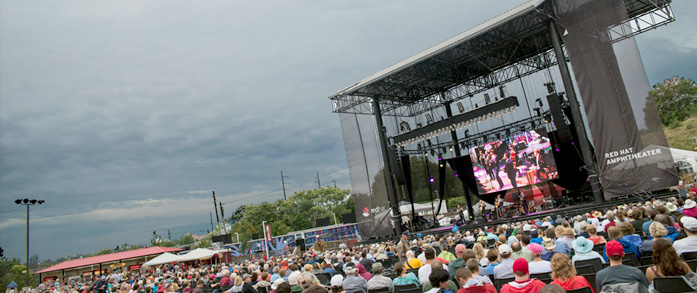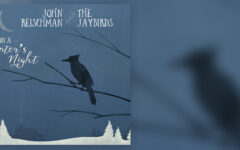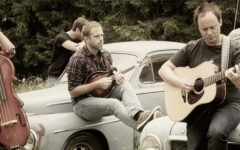
The last set of the night at the Red Hat Amphitheater on Friday, at Wide Open Bluegrass, was heaven. Billed as the Wide Open Jam, that was a rather modest description. It was the pinnacle. It was a fine Loar, or a fine pre-war Martin. It was as good as it gets. Period.
Maybe that deserves a bit of qualification. Everybody loves good lyrics. They can touch the soul, and offer perspective on life. But bluegrass music also has a deep tradition of instrumental excellence. And with all due respect to a good lyric, sometimes it is a treat to hear virtuoso musicianship unleashed and unimpeded. That’s what happened to cap off Friday at WOB.
Sam Bush, Béla Fleck, Stuart Duncan, Edgar Meyer, Jerry Douglas, and Bryan Sutton, along with latecomer Chris Thile, set the bar for any aspirations to excellence in musicianship. In some ways, it was indeed a jam in that different people brought tunes to the party. But in other ways it totally transcended most jams. The range of music was vast. Covering fiddle tunes, standards, and obscure tunes, it called for a command of a variety of styles rarely encountered in any one jam.
It was clear that everyone on stage totally respected and trusted everyone else. That respect radiated throughout the amphitheater, and fueled the interaction between the musicians. Indeed, there was a strong sense of them playing for and to each other more than for the audience. It was like they were having a conversation with each other, with each one, in turn, inspired to greater heights by what had already been said. Those of us watching were simply the grateful observers of a special moment.
The classic explanation for musical perfection applies here. The three “T’s” of music, Time, Tone, and Taste were the building blocks for this tour de force.
As is often said, the difference between good music and great often hinges on the expression of time, or the pulse. Here the time was perfection. Everyone knew exactly where each beat was pulsing, and any deviation from that was intentional for effect. If music were to be compared to painting, sometimes the pulse is as big as a paint brush for the exterior of a house. That is what our ears register as sloppy music. Many jam sessions can be the scene of this kind of beat. Other times the beat is as big as a felt tip marker. Our ears register that as, gee maybe they could use a little practice. In this jam the pulse was the size of a fine point pen. Exact means exact.
And while we’re on the subject of time, it wasn’t enough to have perfection throughout the night. The guys felt inspired to challenge themselves even further. At the end of the set, Sam Bush announced that they were going to do a John Hartford tune, but not one of the usual ones. They took on On the Road from the Morning Bugle album. Time becomes extra complex with a tune that has five beats to the measure, rather than the usual four or three. Hearing and watching talented people take on a challenge in this way can be inspiring and humbling all at once.
As for tone. Yup, everybody was playing a great instrument. But to say that the tone came from the instruments would be a serious mistake. The tone came from the hands that held those instruments, and the tone was simply gorgeous. It is astounding to sit back and truly consider that these sounds come from the creative combination of wood and wire. Half of the instruments, the fiddle, dobro, and bass, depended on the hearing of the player to get the note perfect, and not out of pitch. Done. Edgar Meyer took on a fiddle tune in the upper registers of the bass that left heads shaking in disbelief. And each player spoke through their instrument with a voice that was the embodiment of beautiful tone. Lines that were expressed clearly, notes that rang with defined presence.
Taste is the last of the binding forces for excellence. This is a particularly elusive thing, and perhaps it is impossible to truly measure or compare. Certainly one person’s taste is not the same as the next person’s. But with the level of talent and dedication brought to this show, any reservations about taste need to be carefully considered. The artistic vision of these players has been honed to such a degree that most of the rest of us would do well to take the stance that there is a great benefit to be had from trying to understand the music and appreciating the taste expressed.
Taste is wrapped up in tradition, expectations, and the expression of feelings. There is one line of thinking in the bluegrass community that calls for the exact expression of certain classic sounds, and anything outside of that style is not in good taste. But the classics were breaking boundaries at the time. If the attitude is that the bluegrass style is to break boundaries, rather than to re-create the particular licks that broke boundaries in the early days, the spirit lives on in these players. With different sounds. One example from this set is Bryan Sutton making use of octaves on the guitar. This is a style of expression that is known in the jazz world, but relatively unused in the bluegrass world. Another example is Béla Fleck intentionally floating above the pulse with banjo lines that have almost a guitaristic feel to them. Again, breaking boundaries and challenging taste.
Stuart Duncan and Jerry Douglas have set the vocabulary for so much that it is easy to not fully remember or comprehend their contributions. Their voices were as brilliant as ever throughout the night. And Chris Thile is pushing boundaries everytime he touches his instrument, as he did on On the Road.
Sam Bush pushed the group, provided vocals, and offered his strong rhythmic energy to the proceedings. He also acted as spokesman for the group, which brings up one final thought. Sam mentioned, just off hand, that this was a gathering that had been happening yearly at Telluride. I, for one, became really jealous that the Telluride community got the opportunity to hear this congregation of talent on a regular basis. I wish that there could be a way to have this happen in more places, at more times.







